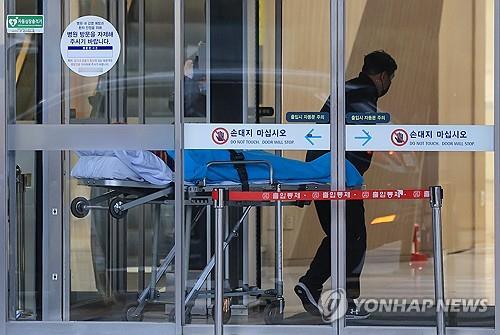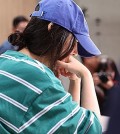- California Assembly OKs highest minimum wage in nation
- S. Korea unveils first graphic cigarette warnings
- US joins with South Korea, Japan in bid to deter North Korea
- LPGA golfer Chun In-gee finally back in action
- S. Korea won’t be top seed in final World Cup qualification round
- US men’s soccer misses 2nd straight Olympics
- US back on track in qualifying with 4-0 win over Guatemala
- High-intensity workout injuries spawn cottage industry
- CDC expands range of Zika mosquitoes into parts of Northeast
- Who knew? ‘The Walking Dead’ is helping families connect
Major hospitals show signs of strain as over 70 pct of trainee doctors submit resignations
Scheduled surgeries have been reduced or delayed at five major general hospitals in Seoul, with signs of strain in medical services looming, as more than 70 percent of trainee doctors submitted their resignations against a plan to boost the number of medical students.
Concerns over public health have heightened as doctors and the government traded barbs over the plan to raise the medical school admission quota by 2,000 seats next year.
With trainee doctors walking off the job, the five major hospitals in Seoul have reportedly canceled or delayed surgeries.
The five hospitals — Asan Medical Center, Samsung Medical Center, Severance Hospital, Seoul National University Hospital and Seoul St. Mary’s Hospital — have played a key role in providing medical care for critical patients.
As of Tuesday, a total of 8,816 trainee doctors, or 71.2 percent of the junior doctors, had submitted their resignations and 7,813 of them left their work sites, Second Vice Health Minister Park Min-soo told reporters.
Park said the government ordered 6,112 trainee doctors to return to work. So far, the ministry has received 92 complaints in connection with the trainee doctors’ collective resignations.
Trainee doctors appeared to up the ante in their confrontation with the government, as about 6,400 had submitted resignations as of Monday. There are some 13,000 trainee doctors in South Korea.

“No country in the world has seen medical workers taking collective action while leaving critically ill and emergency patients,” Park told reporters. “I am disappointed and concerned over the idea of doctors’ groups believing that doctors’ rights come before patients’ lives.”
“The trainee doctors’ right to take collective action cannot have precedence over people’s basic right to life,” Park said.
To cope with a potential disruption to medical services, the government has extended operating hours at 97 public hospitals and opened emergency rooms at 12 military hospitals to the public.
Despite the government’s back-to-work order, trainee doctors have shown no sign of backing down.
In a statement, the Korean Intern Resident Association, a major organization of trainee doctors, demanded the government withdraw the plan to increase the number of medical students.
Describing the plan as “ridiculous,” the association criticized the government for treating trainee doctors as “criminals by overusing extrajudicial executive orders.”
The government says the increase in the admission quota is needed to address a shortage of doctors, particularly in rural areas and essential medical fields, such as high-risk surgeries, pediatrics, obstetrics and emergency medicine.
The number of doctors in South Korea relative to the size of the population is among the lowest in the developed world, according to health authorities.
But doctors have claimed that the government has not had full consultations on the matter and that the move will compromise the quality of medical education and services.











